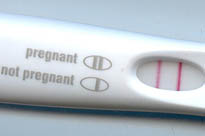When I imagined trying to get pregnant, I imagined the horniest sex of my life and a happy “it’s positive” pee-on-a -stick moment in the bathroom.
I did not think about hurrying to an infertility clinic at 7am while trying to keep a sperm sample warm under my arm. But when I was diagnosed with fertility problems, scenario two became a real possibility.
I’d always worried I might be infertile.
That might sound irrational to most people, but I had irregular periods – to the point where I had nine months without one – and an aunty with something called polycystic ovary syndrome (PCOS).
It was a few months before my wedding, and I wanted to know what I was dealing with, so I got a referral to a fertility clinic and faced the music. I did indeed have PCOS and after many tests, through many tears, had to face up to my fertility sooner than I’d like.
It seems most of us coast through life assuming we can have a baby – and easily. But what happens when life throws us a curveball?
First of all, it’s not the end of the world. Though it feels like it, and it seems like you’re the only person going through it, it’s estimated one in six couples experience some kind of infertility. They just probably don’t talk about it.
Secondly, there’s so much you can do. From trigger shots to make you ovulate to IVF, there’s more than one way to skin a cat when it comes to making babies.
If you’re like me, you might want to know in advance, but that might be difficult.
Dr. Tom Hannam, of Hannam Fertility Centre in Toronto, says most of us worry unnecessarily about fertility. The best way to know if there’s a problem is to try and get pregnant.
“The way you know you’re infertile is if you’ve been trying to get pregnant and it’s not really working. Unless you’ve been trying, you don’t really know,” he says.
“Most people are not infertile, that’s the good part. Most women get pregnant the first month they try. If you look at the stats, 35-55% of people get pregnant the first month they try, if they’re under 28. After six months of trying, then it’s only a 5% chance. If you’ve been trying for over six months, then you know something is up.”
Even if you’re not ready for a bundle of joy, it doesn’t hurt to be aware of what might stop it arriving as soon as you’d like:
- PCOS – This syndrome isn’t fully understood by doctors yet. You’ll likely have plenty of good eggs, but irregular periods, making it difficult to know when to time baby-making nookie
- Endometriosis – A painful disease that involves tissue similar to that which lines the womb growing in other parts of the body, such as the fallopian tubes. It can cause scarring, making it difficult to get pregnant. According to endometriosisassn.org, it affects one million women in Canada.
- Fibroids – Muscular (usually non-cancerous) tumours that grow in the womb, making it difficult to become pregnant and sustain a pregnancy.
- Age related – Fertility decreases with age as you have fewer good eggs and there is more chance of the baby having a genetic problem
- Multiple miscarriages – You won’t know if you have a problem with this one until you get pregnant, but some women have heartbreaking miscarriages one after another. It can be caused by genetic issues, problems with your uterus, hormone levels and other things.
Having one of these problems doesn’t mean you will struggle, it only means you could. If you’re worried, book an appointment with your doctor and discuss it with them – most fertility tests are quick and painless.
And if you do have fertility problems, have hope; I’m now almost four months pregnant!
~Charlotte Percival-Gonzalez, Photo by Klaus Hoffmeier



 Follow Us On Instagram
Follow Us On Instagram
